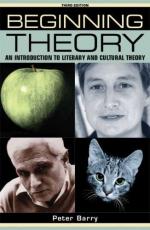
|
| Name: _________________________ | Period: ___________________ |
This quiz consists of 5 multiple choice and 5 short answer questions through Post-structuralism and deconstruction.
Multiple Choice Questions
1. All of the following religious believers were not allowed to attend university in England in the nineteenth century except which one?
(a) Catholic.
(b) Anglican.
(c) Atheist.
(d) Jewish.
2. According to the chapter titled Post-Structuralism and Deconstruction, structuralism derives ultimately from ________.
(a) Linguistics.
(b) Mimesis.
(c) Hermeneutics.
(d) Formalism.
3. Who was the first critic to develop a "reader-centered" approach to literature?
(a) Plato.
(b) Sophocles.
(c) Sigmund Freud.
(d) Aristotle.
4. Which of F.R. Leavis's teachings was essentially a syllabus, manageable within a year-long undergraduate course?
(a) Great American Literature.
(b) Great Tradition.
(c) Great Expectations.
(d) Great Explorations.
5. What example did Saussure use to explain what he meant by saying that there are no intrinsic, fixed meanings in language?
(a) Animal Farm.
(b) Ulysses.
(c) 8.25 Geneva to Paris.
(d) 1984.
Short Answer Questions
1. The narrator suggests that liberal humanists believe in ________ as something fixed and constant which great literature expresses.
2. The narrator informs the reader that in the early 1980s, two new forms of political/historical criticism emerged, new historicism from ________ and cultural materialism from ________.
3. According to the chapter titled Structuralism, what is another term for "alba," the poetic form dating from the twelfth century in which lovers lament the approach of daybreak?
4. Who was appointed Professor at King's College, London in 1840?
5. What language does the narrator describe as being a Romance language that takes most of its words directly from Latin, and lacks the reassuring Anglo-Saxon layer of vocabulary?
|
This section contains 259 words (approx. 1 page at 300 words per page) |

|




